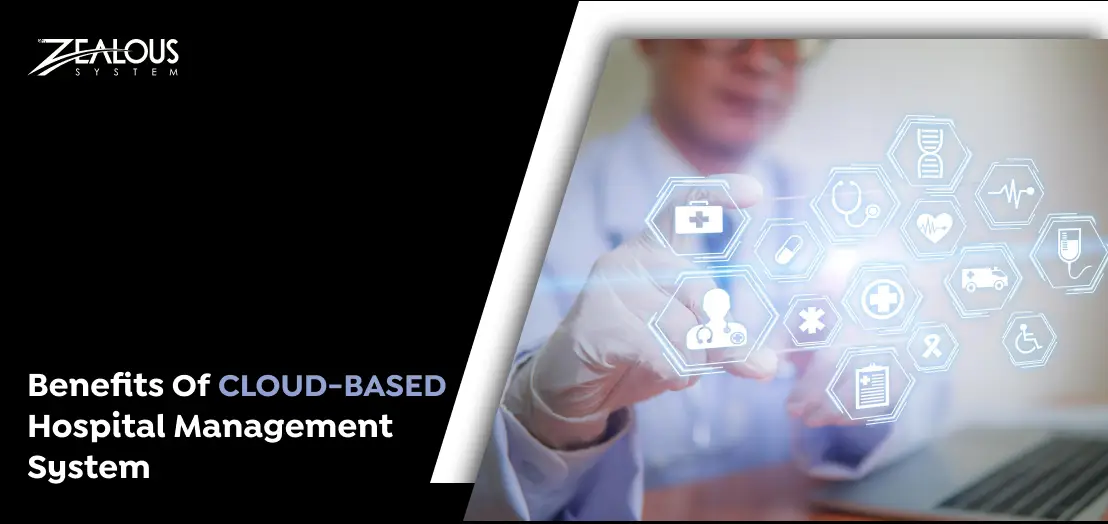


Technology is rapidly changing, and healthcare has not been left behind. Just a decade ago, who would have imagined that wearing a watch or monitor could track our blood glucose levels, blood pressure, or ECGs? These advancements led to the creation of the Healthcare Management System (HMS), which seamlessly integrates administrative, financial, and clinical operations.
An HMS encourages cost-effective practices, ensures regulatory compliance, and focuses on patient-centered care, leading to better outcomes and increased satisfaction across the healthcare system. With technology advancing quickly, the healthcare industry now faces a vast amount of data that needs to be easily accessed, even in remote areas, while ensuring its security.
A cloud-based hospital management system can address these challenges. It also incorporates artificial intelligence and machine learning to improve diagnostic accuracy and treatment planning, resulting in more personalized and effective healthcare.
In this blog, we will explore the benefits of a cloud-based hospital management system. Let’s start by understanding what it is.
A Cloud-based Hospital Management System (HMS) is a digital platform that helps hospitals manage all their operations online, using the cloud. It combines different hospital functions, such as patient records, billing, appointments, and staff management, into one system that can be accessed from anywhere with an internet connection.
Instead of using physical servers and storage, a cloud-based HMS stores data securely on remote servers. This means healthcare providers can access important information quickly and easily, whether they are at the hospital or in a remote location. The system is designed to improve efficiency, reduce paperwork, and make hospital operations smoother.
By using the cloud, the hospital does not need to worry about maintaining expensive infrastructure or dealing with system downtime. Updates and security are automatically handled, ensuring the system is always up-to-date and safe. Additionally, cloud-based HMS allows for better collaboration between different departments, improving patient care and overall hospital management.
Cloud computing is rapidly growing in healthcare as more organizations move their data to the cloud. This technology allows healthcare providers to store and manage large amounts of patient data securely and efficiently. With the increase in medical imaging and other data, cloud computing provides the necessary storage and processing power.
One key benefit is cost savings. Traditional data centers can be expensive to maintain, but the cloud offers a pay-as-you-go model, reducing costs for hospitals and clinics. This allows them to invest more in patient care.
Cloud computing also improves collaboration among healthcare professionals by giving them access to patient data from anywhere, leading to better care coordination. It also supports innovations like telemedicine, especially for patients in rural areas.
With strong security measures to protect patient data, including encryption and regular backups, cloud computing is meeting the industry’s privacy requirements. As healthcare organizations continue adopting the cloud, it is expected to improve patient care and healthcare delivery.

Healthcare institutions focusing on cloud-based healthcare management systems can handle complex data better with a shared, cloud-based IT system. Cloud platforms let data be accessed from anywhere, which is crucial for modern care models. Patient information can be seen in various places like homes, clinics, and hospitals, making healthcare more flexible and effective.
Let us look into other such benefits.
A cloud-based healthcare management system offers healthcare professionals easy access to detailed and current patient information. This helps them coordinate and collaborate with different departments, leading to efficient and accurate decision-making. By storing medical reports and ongoing treatments, the system gives a complete view of the patient, ultimately enhancing the quality of care provided.
A key benefit of integrating a health management system with the cloud is the smooth exchange of information. This is made possible by eliminating manual data entry and the need to fax records. Using standardized protocols and data formats ensures easy communication between systems and a smooth transition of care.
Adopting a cloud-based healthcare management system can prevent time and administrative losses. In the healthcare industry, time is crucial. By simplifying access to patient information and eliminating redundant tests, hospitals can save valuable time and focus more on providing quality care to patients.
Cloud-based healthcare IT systems benefit patients as they take an active role in their healthcare. For instance, telehealth apps let patients have remote consultations and track basic health stats using smartphones or wearables. Cloud-based electronic health records (EHRs) and electronic medical records (EMRs) give patients constant access to their medical information. They can easily share this information with healthcare providers through health information exchanges, eliminating the need to carry paper records.
A beneficial impact of the healthcare management system in healthcare is the ability to be flexible and to grow as organizations get bigger. Predictive tools give smart ideas that help make decisions both inside and outside hospitals.
For instance, AI tools make patient scheduling smarter. These solutions also watch how patients move and use beds, helping doctors and managers give the right care and safely send patients home. This makes healthcare better and safer for everyone.
Adopting a cloud-based healthcare management system can prevent time and administrative losses. In the healthcare industry, time is crucial. By simplifying access to patient information and eliminating redundant tests, hospitals can save valuable time and focus more on providing quality care to patients.
Centralized healthcare data storage is a proven benefit of cloud computing to healthcare sectors as the healthcare management system could now help healthcare organizations in numerous ways, like managing patient care effectively. Storing data in the cloud lets doctors, nurses, specialists, and other healthcare professionals communicate and work together in real time, using the latest information about patients.
A robust digital health platform can further improve this collaboration, ensuring seamless access to patient data and improving overall healthcare delivery. The cloud’s ability to store, access, share, and analyze data improves how healthcare is managed. This leads to better, more organized care that focuses on patients and makes healthcare delivery more efficient.
As we look ahead, the future of healthcare undoubtedly lies in the continued integration of technology, from telemedicine software and virtual reality to AI-driven diagnostics and remote monitoring medical devices. These innovations not only improve access to care but also empower patients to take a more proactive role in managing their health.
Implementing these latest healthcare technologies ensures that healthcare remains responsive to the needs of a rapidly changing world, where quality care is accessible to all, regardless of location or circumstance. That is why we at Zealous System believe in providing custom healthcare software development services and hospital management system development that are reliable and efficient. Take your business to new heights with us!
Our team is always eager to know what you are looking for. Drop them a Hi!
Comments